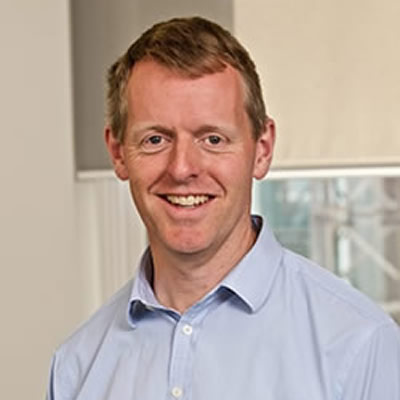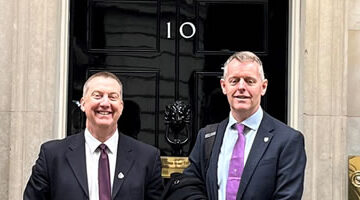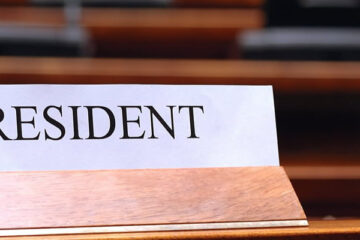EMJ interview with new RCEM President, Adrian Boyle

Adrian Boyle, EM Consultant in Addenbrooke’s Hospital Cambridge, succeeded Katherine Henderson as President of RCEM at the AGM held on 4 October 2022 during the Scientific Conference in Belfast.
The EMJ Supplement caught up with him last month to ask about his hopes and aspirations for the next three years. We also found out about rowing and Tilly the dog.
Diana Hulbert (DH)
Adrian, tell us about you.
Adrian Boyle (AB)
I grew up in Ilkley, West Yorkshire in the 1970s. I’m obviously an accident because my brother is nearly 13 years older than me and my sister is 8 years older than me. My parents were completely done with the concept of child rearing by the time I came along and they frankly had had enough. So I was largely left to my own devices.
I was a fat, lumpen, hopeless child. I was not good at school or playing games. I was so bad at games I spent five years as the scorer for the 1st XI cricket team.
My parents needed a break – I wasn’t naughty. I was just a bit hopeless and I was very fortunate I got sent away to board at 13 and they pushed all of us, in the modern phrase, to be our best selves.
Essentially I found a sport I could do and that gave me an enormous confidence; rowing is where you send people who can’t do any other sport at age 14, I was 5 foot 11 and 14 stone. It was hard work, lots of miserable training in the morning, getting up in in the cold and the dark.
But at the same time also you gained a status thing; Shrewsbury was the second best rowing school in Britain at the time and they regularly produced half the blue boat. I went on to row internationally. After I left school I went straight into the British rowing team and spent 6 weeks hammering up and down the Ely which is where all the international crews go to do their pre races, went to a European Championships, got 2 gold medals came back and thought the world is my oyster.
DH
And when did you suddenly have this light bulb moment that you were going to do medicine?
AB
There was no medicine at all in the family. So on my mother’s side, largely military and on my father’s side business and activism, which is interesting. There’s a man in my distant past who was sent to Newgate Prison for organising an uprising of the workers in the North.
I think it’s interesting why people go into medicine. It’s not entirely about altruism. I clearly recognised that I needed to be in some form of institution and I like the idea the relative security of tenure and the guaranteed progression.
But I had to apply second time around, as my A level predictions were not strong and my first time I applied to medical school I received no offers but they offered a transfer to do soil science at Manchester University.
I went to Southampton University, which is not a great place if you wish to be an international rower.
After Southampton I decided that I ought to be a surgeon and I liked surgery. I like the the immediacy and then I did the Southampton surgical house job and that cured me.
I had ideas about working in public health and development. I was so knackered at the end of my first year and I thought I need just to get something a bit broader. So I went and did A and E in Portsmouth.
At the time John Heyworth was Consultant in the department, Cliff Mann was the registrar and Cliff Reid was the senior SHO.
I then went out to South Africa for a year and I worked in a major trauma centre, Tygerberg. Unfortunately, I hadn’t done my preparation homework and it’s the one of three Afrikaans language hospitals in South Africa so I had to learn a bit of Afrikaans. It was pretty basic. The standard was either amazing or terrible.
On return I did a medical job at Poole and then I got a medical rotation with EM in it in Sheffield which was run by Jim Wardrope and Frances Morris.
I then had a fiancée who was in Cambridge – she’s a scientist, much cleverer than me, with an Oxford degree and a PhD – who works for a major biotech company and is head of global research projects. So I went to the East of England EM rotation and became Consultant at Addenbrooke’s in 2005.
I had a long training programme because I took a year out to do a masters in epidemiology in bio statistics and then I went on to do a MD in epidemiology and worked for a bit as a post doctoral researcher. I started doing a research project for my doctorate, which is all about trying to use help victims of domestic violence who come to emergency departments.
I’ve had times where I went to present my research to what might be a potentially very hostile audience. I had to go. And I was the only man to present at the Women’s Aid conference one year and they only had booked me because they thought Adrian was a female name.
DH
So tell me about your College career? Going way back what was your first college job?
AB
I had written a paper about domestic violence, which Steff Nash, who was the chair of the audit committee, said could you turn this into a College guideline and would you be interested in running the best practice subcommittee? So the first thing I did for the College was set up the best practice committee in about 2007. I then chaired what was called the Clinical Effectiveness Committee and it became quality in emergency care. I did that twice and then became VP for policy.
DH
Tell me about academic EM.
AB
The training that we’ve done around critical appraisal, and the leadership that we’ve seen around the research networks, has resulted in the quality of research we’re doing being excellent. When I talk to my trainees, now they get why research is important and I think that’s partly because it is much more relevant and much better.
DH
How relevant do you think the College is to an average EM clinician now who’s working hard, feels a bit hassled, a bit cross about the pension? How relevant is RCEM to EM trainees?
AB
I’ve been going around meeting other College presidents and they all talk about how do they make themselves relevant. I think we do well but there’s clearly work to do. The College has a job to explain what it can and can’t do and then explain what it’s trying to do. We can’t lobby on terms and conditions because we’re not a Union. Trying to explain what we do, what the BMA, does what the CQC does, what all these various bodies do, is complicated because, as a trainee, most people’s experience of the College is the person who takes your money for an exam, makes you sweat, gives you a miserable time around exams, does your portfolio. The College has to be much more than that, and people need to know that it’s much more than that. So I’m really keen to try and get member engagement going.
One of the things that we need to do is reconnect people. The fortnightly zoom meetings that Katherine did for the clinical leads were excellent. I want to try and extend that and hold a fortnightly webinar that’s relevant. It might be about training, about quality, or around policy.
DH
What is your position on ACPs?
AB
The first task is to make sure everyone understands what the landscape is at the moment. We’ve got two constituencies – we represent ACPs in the same way that we represent trainees, SAS Doctors and Consultants. We need to be framing this as around this is an additional service, not equivalence
It’s really clear from everything that’s coming out of government, the approach towards medical school places, there’s going to be no new training numbers in Emergency Medicine for quite a long time, though we will lobby hard on this.
DH
Tell me about the main challenges that you face in the next three years.
AB
The first thing is that we need to actually try and sort out crowding. It erodes everything that we try to do – our staff well-being, our staff retention, the quality care we give to our patients. It is the exit block that’s driving this and you know I think of the over the last 10 years, I think we’ve won the narrative. No one says very much that our departments are full of people who are shouldn’t be there. The inappropriate attender narrative has gone away, and the idea of 40% could be looked after by someone else has also gone away. But I think we will keep going on that issue because it’s an option that people keep bringing up to avoid tackling the problem.
The next big issue is workforce; we have the highest rates of burnout amongst our trainees. It’s the hours, it’s the rota, you know. I didn’t do nights as a registrar in EM I did on call and sometimes I actually went home and went to sleep. I remember in the evening sometimes there were bits of downtime where I could go into resus and train the new SHO’s how to use a defib.
You could not do that now. People see how busy it is and how hard the guys work so I think we would all been a little bit wary of the idea of doing nights at that intensity and signing up for that for the next eight years, or even forever.
There’s a piece of work to make the CESR process much more streamlined and much less onerous. If you take time out to go and have a baby that you lose CESR time. You know there’s all sorts of unintended things. We need to make the CESR process much fitter for purpose.
The third challenge is an internal thing for the College to sort out exams. The problem that we had in the summer was absolutely heart-breaking. And you know, we need to get to the point where the exams are high reliability. There’s been an enormous amount of investigation and work to try and stop this happening.
I’m so pleased with the people I’ve got around me now. We’ve just gone through the VPs appointments, eight great people applied and many more expressed an interest.
One of my top priorities is to make the College a more representative organisation.
I’m moving almost every meeting I can do online now but there’s a tradeoff. There’s nothing nicer than being in the room; the conversation you have before the meeting, the coffee, perhaps going for drink afterwards, that’s all valuable. But the problem is you make it so hard for people to get to those meetings you immediately shrink the pool.
Finally Standardisation – we really have to start to standardise the processes we use. If you go into NatWest in Aberdeen, it looks the same as NatWest in Southampton.
I think we urgently have to do this. What do you use for triage in your department? Everybody uses something different. Are they all right? No, we can’t all be right.
Standardisation around what Consultant roles are within a department. Iain Beardsell in Southampton did a really good piece of work where he had a list of what everyone is supposed to do and how much time should attached to it.
DH
What is Katherine’s legacy do you think?
AB
Katherine did a fantastic job in exceptional and uniquely challenging circumstances. Katherine’s legacy will be that she connected us and kept us together during the pandemic. The restless energy that she brought and connecting the clinical leads WhatsApp group and the zooms. In holding it all together, representing us to government and to people who have no idea what we do.
DH
And so obviously you’re standing on the shoulders of many giants. Who are your heroes?
AB
One looks back at all the people who’ve done amazing things in emergency medicine. I look at Jim Wardrope and my direct observation about him, is that he was utterly unafraid to say, uncomfortable, difficult things. You know, that was always impressive. Taj did an amazing thing with the EMF programme, which is now really beginning to bear fruit.
Cliff’s ability to articulate so clearly and so reasonably, that you couldn’t help but agree with him. I think it was really impressive. I mean if you look at what all the College presidents have done they’ve all got the thing which stands out that they’ve done really well. You know, Mike’s work on the curriculum, a vast piece of work that established our training as a credible piece of work and then going to the Commons Select Committee and saying this is what the problem is and providing really detailed analytical data so that people thought there’s a new kid on the block. John provided a charismatic face that everyone could look up to and go. “We’ve got a smart guy representing us”.
DH
How are we going to work with initiatives like 111?
AB
NHS 111 has to be seen as a triage service, this is a skilled clinical activity. The fact that we have only 40% of NHS 111 calls having clinical involvement will create all sorts of problems for everybody around the stream. It’s got to have good clinical access.
DH
You’ve got your weekly rowing. What else do you do to keep it all together?
AB
We have a 14-year-old Border Terrier-Jack Russell cross, Tilly – her walk doesn’t take very long
My children are in the process of gradually leaving home. I have a 17 year old who has no idea what she wants to do, but is certainly not going to do anything medical and then I have a 20 year old who is just finished her first year of history at Nottingham University. She’s interested in health policy, but who knows? Maybe after watching me for three years, she’ll be less interested
DH
Are you looking forward to being President?
AB
I’m apprehensive because things are so tough at the moment but I console myself with the fact that it makes the task obvious, and I know it’s going to be really challenging for the next couple of years.
I am ready for the challenge.


0 Comments